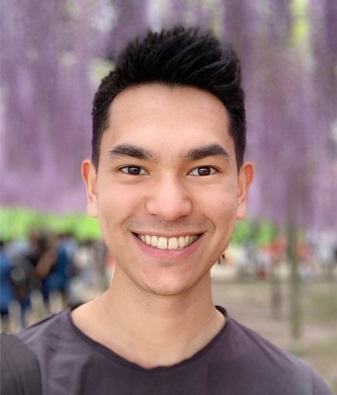Nick: I was thinking... What if I came out?
Charlie: Do you really want to?
Nick: I really want to. I know I've been pretty unsure of everything for a while. […] I'm not saying I want to have a public announcement or anything, but I want to tell the people who matter.
There are many moments in Netflix’s Heartstopper, a popular coming-of-age series about queer Gen Z high school students in England exploring their identities and relationships, where Andy Holmes sees themes of his recent research published in Theory and Society — mainly that coming out today as a sexual minority is, well, complicated.

“We’ve never lived historically in a moment characterized by both unprecedented social acceptance and intensifying threats to LGBTQ2S+ rights,” says Holmes, PhD student in the Department of Sociology at the Faculty of Arts & Science. “I was curious about — how do people feel about disclosing their sexual orientation, and what it means to be lesbian, gay, queer, bisexual, pansexual and more, in such a complex time?”
While Gallup polls in the United States show that there is more LGBTQ2S+ visibility in the last couple decades than ever before, there is alarming social and political backlash. Over 525 anti-LGBTQ2S+ bills have been proposed in the U.S. this past year alone. Meanwhile in Canada, the latest Statistics Canada report shows a 64 per cent increase in hate crimes against individuals over their sexual orientation.
For their study, Holmes and his co-author, University of British Columbia Professor of Sociology Amin Ghaziani, conducted in-depth interviews with 52 adults based in Vancouver about their experiences coming out as a sexual minority over the last five years.
All experiences are important and valid — I hope our work shows people that they're not alone.
“In the 1980s and 1990s, coming out could be defined as a period of struggle and courage in a homophobic society. Then Ellen DeGeneres came out in 1997, same-sex marriage was legalized in Canada in 2005, and you start to see these moments that might be characterized as triumphant success,” says Holmes.
“We found that today, people’s experiences are landing somewhere in between. Deep ambivalence, or mixed feelings, was a central theme — though not a universal one — of our respondents’ narratives, and these mixed feelings seem to be rooted in the mixed messages of recent social trends.”
The researchers spoke to people diverse in gender identity and sexual orientation, and just under half of respondents identify as members of racialized groups. While their study reflects a small sample size, Holmes notes its storytelling design is important because “it captures how people make meaning from their coming out experiences in the present moment and validates that there are many different kinds of these experiences.”
Context and intersectionality inform these narratives.
“When people deal with entrenched forms of discrimination related to intersectional identities, coming out is imbued with a sense of special significance, rather than ambivalence,” says Holmes.
Alice, a 26-year-old bisexual, white woman, shared with the researchers that her disability influences how she thinks about her sexuality: “To say that we have marriage equality, we don’t, because queer disabled people don’t have marriage equality. People who are disabled may lose [disability] benefits because their spouse’s income will make their incomes high enough so that they don’t qualify.”
“One of the most terrifying things about coming out for me was this duality,” 31-year-old Marcus says about his queer and Indigenous identities. “I had to, over many years, build up the strength to withstand a world that I knew was going to treat me unfairly.”
Holmes found that other people seem to be trying to balance the importance of their sexual orientation in their lives and leverage it in moments where it matters — for instance, in community at queer venues and in the face of bigotry. In other contexts, like at work or with certain family members or friends, it might lose this salience.
“Coming out is about sharing your identity with someone, and it’s never a one-time process — it could happen when you are being interviewed for a job, when you are applying to rent a new place, when you are meeting older family members or meeting new people on vacation,” says Holmes. “Our sexual orientation becomes more distinct because other people make it matter.”
Awareness of generational differences also arose as a reason for feelings of ambivalence. More people, on average, are expressing LGBTQ2S+ identities today — according to the 2022 Gallup poll, 19.7 per cent of Generation Z (born 1997–2004) and 11.2 per cent of Millennials (1981–1996), compared to 3.3 per cent of Generation X (1965–1980) and 2.7 per cent of Baby Boomers (1946–1964).
Holmes notes that making sense of one’s own coming out process is complicated by both social progress and regression, and that conflicting levels of social support adds to mixed feelings.
For Wren, a 23-year-old, white, non-binary person who identifies as queer, coming out to friends was informal and “just happened naturally. I don’t think that’s the case for a lot of older generations of people.” They acknowledge, “there was fear surrounding it” but “it wasn’t fear of persecution or social exile. They [were] smaller fears.”
Whereas Baldeep, a 36-year-old gay woman of Indian descent, describes a sense of stigmatized difference: “The only education I got was about straight people and relationships, so I always felt that there was something wrong with me.” She anticipates that coming out is easier for people of Wren’s age and younger, while grappling with the effects of social changes: “I think still it can be very difficult, but not as difficult as the generation before me.”
To support someone who has recently come out, Holmes says it’s important to acknowledge that there is a diversity of coming out narratives.
“All experiences are important and valid — I hope our work shows people that they're not alone.”
With files from the University of British Columbia.

